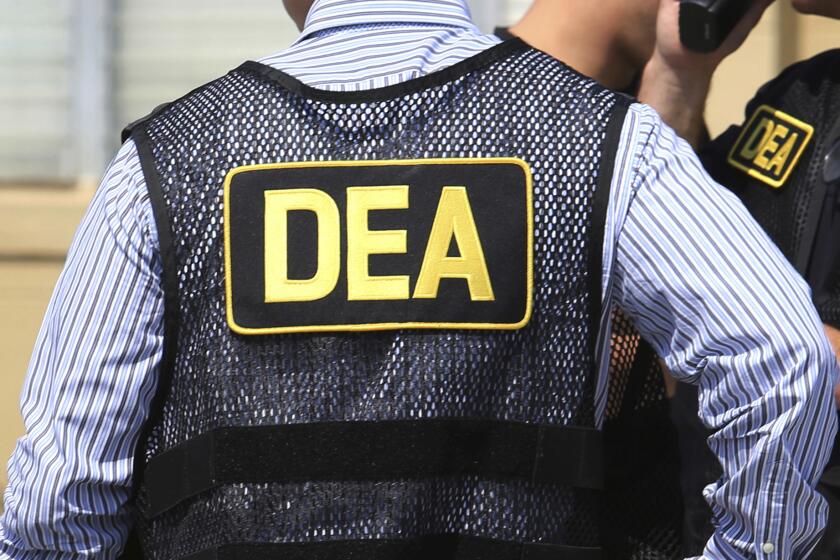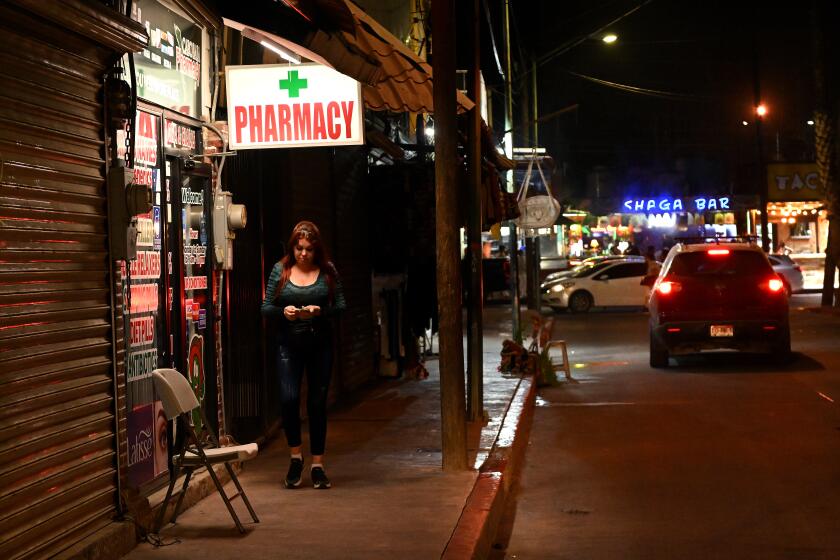New street drug is surfacing, threatening to make California’s overdose crisis worse

- Share via
A new drug — a sedative normally used for animals — is increasingly making its way into the illicit drug trade in California, and local officials are concerned its arrival could worsen an already alarming overdose crisis.
Traces of xylazine, commonly known as “tranq,” have been found to have contributed to a small number of overdose deaths in San Francisco and Los Angeles, indicating the drug commonly used by veterinarians to tranquilize animals has already started to make its way into illegal street drugs here.
In San Francisco, four people who died between December and January were found to have low levels of xylazine in their systems, prompting the city’s Department of Public Health to issue a warning on Thursday about the drug, noting that it could be mixed with other drugs like fentanyl and heroin, unbeknownst to the user.
Dr. Gary Tsai, director of substance abuse prevention and control for the Los Angeles County Department of Public Health, said traces of the drug were found in the system of one fatal overdose victim in the county in 2021.
Although no other cases have been detected locally, Tsai said the lack of awareness and testing for xylazine could mean its real impact has been underreported.
“Because it’s not that common, it’s not routinely tested for,” he said. “It’s possible that it’s more out there.”
Still, Tsai points out that tranq is increasingly showing up across the country, usually mixed with opioids to increase their effects.
U.S. law enforcement officials first noticed tranq’s use as a street drug in Puerto Rico, but then found it began to make its way to states in the Northeast.
“It’s not that common yet, but similar to fentanyl, it was more prevalent in the East Coast and it’s moving west,” Tsai said. “This is something that’s concerning.”
In an October 2022 report, the federal Drug Enforcement Administration warned that xylazine was increasingly being detected in illicit drugs.
The DEA says it’s finding xylazine, or ‘tranq,’ in drug seizures at increasing levels in the U.S. In San Diego, it remains relatively rare.
Although the drug is sometimes used on its own, the DEA reported it is most often found combined with other substances, including fentanyl, cocaine and heroin.
Xylazine is primarily used in veterinary practice as an animal muscle relaxant; it has not been approved for human use.
“It may also attract customers looking for a longer high since xylazine is described as having many of the same effects for users as opioids, but with a longer-lasting effect than fentanyl alone,” according to the DEA report.
The drug is difficult to detect because, as a sedative, it creates the same kind of effects as the opioids that it’s often mixed with, such as sleepiness, reduced breathing and lower blood pressure, Tsai said.
But people who inject xylazine have been found to also experience tissue damage such as ulcers or sores, and in some cases the damage can result in amputation.
And unlike opioids, xylazine is not affected by naloxone, the medicine used to reverse opioid overdoses, Tsai said.
“The main concern is we’re already amid the worst overdose crisis in history, nationally and locally,” he said. “This would increase deaths from overdoses.”
The risk is so high that the U.S. Food and Drug Administration sent healthcare officials a notice in November warning that the presence of xylazine could even hamper the effect of naloxone in fentanyl and heroin overdoses. There is no known medicine to reverse the effects of xylazine.
Pharmacies in several Mexican cities are selling counterfeit prescription pills laced with fentanyl and meth and passing them off as legitimate pharmaceuticals.
The FDA recommended officials continue to use naloxone for suspected opioid overdoses, and “provide appropriate supportive measures to patients who do not respond to naloxone.”
Despite naloxone having no effect on xylazine, Tsai agreed that it still makes sense to use naloxone in the case of an overdose in an effort to reverse the effects caused by opioids and increase the chance of survival.
Like most parts of the country, Los Angeles County has seen a dramatic and alarming increase in the number of overdose deaths in recent years, largely fueled by fentanyl’s rapid spread and its use in illegal drugs.
In 2019, the county recorded 1,652 accidental overdose deaths, including 462 linked to fentanyl, according to the county’s Department of Public Health. By 2021, the number of accidental overdose deaths in the county had risen to 2,741, with 1,504 caused by fentanyl.
L.A. County health officials have reached out to local law enforcement agencies and the county coroner to inquire about and increase awareness of xylazine.
More to Read
Sign up for Essential California
The most important California stories and recommendations in your inbox every morning.
You may occasionally receive promotional content from the Los Angeles Times.












